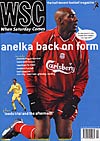 Michael Hughes looks at Jamie Cureton and Bristol Rovers
Michael Hughes looks at Jamie Cureton and Bristol Rovers
Boxing Day 2000 at the Memorial Stadium, Bristol and and obscene chants are being aimed at a visiting player. Just four months previously Jamie Cureton had beena terrace hero, scoring for Bristol Rovers on the opening day of the season. Now he was back playing for Reading and facing some vitriolic abuse.
Born and brought up in Bristol, Cureton was a Manchester United fan, although Rovers were his Bristol team. He was spotted by Norwich as a youngster and even though he did not quite make it at Carrow Road, he created an impression, not least when he dyed his hair green and scored in the East Anglia derby.
Ian Holloway, himself a fervent Rovers fan, made Cureton one of his first signings when he arrived as player-manager in the summer of 1996 and although initially a loan deal, it was seen as a major coup. Rovers had just moved back to the city after ten years playing in Bath. Signing a Bristolian seemed to capture the mood of the club. The initial loan spell was successful and a £250,000 deal was agreed. However, Cureton was often shunted into midfield and it was not until Barry Hayles left that he flourished, his partnership with Jason Roberts becoming Rovers’ most successful double act since “Smash and Grab”, Bruce Bannister and Alan Warboys, in the mid-1970s
The pair guaranteed goals, goals which in 1999 took Rovers to the fifth round of the FA Cup for the first time in 20 years. The partnership reached its greatest height, though, in an extraordinary league game at the Madejski Stadium against Reading. Cureton scored four goals in 21 minutes in the second half and Roberts added two more. It was Rovers’ best away win since Bannister and Warboys scored seven in an 8-2 win against Brian Clough’s Brighton in 1973.
Cureton was top scorer in the Second Division in 1998-99 and things carried on successfully until, in January 2000, Rovers lost midfielder David Pritchard to a horror tackle from Titus Bramble that would eventually cost Pritchard his career. A month later Ronnie Mauge broke his leg playing for Trinidad and Rovers’ season crumbled. Despite being top on March 14, they failed even to make the play-offs. In the run-in Holloway broke up his prolific strike force and Cureton, one of the Second Division’s most prolific scorers, had to go back into midfield again.
The failure to win promotion meant Rovers would probably have to sell one or both of their top strikers. Yet while Roberts’s move to West Brom was fairly straightforward, the transfer of Cureton caused massive controversy in the city. Since Rovers had sold reserve striker Bobby Zamora as well, many fans assumed that Cureton would stay. Rovers were reported to have turned down a bid of £500,000 from Hibernian and were looking for £1 million from any sale. Then, after one league game, in which Cureton scored the equalising goal, he hurriedly joined Reading for the same £250,000 fee that he had signed for in 1996.
There appeared to be three schools of thought regarding the move. One said that Cureton needed more money, for various rumoured reasons. Another said that Holloway wanted rid of a player he saw as a disruptive influence. “One thing Holloway got annoyed about was Cureton’s attitude – particularly in the last game of the 1999-2000 season where he noticed Jamie sharing a joke with a Cardiff player near the end of the game,” says Hazel Potter, editor of The Second of May fanzine.
The third was where imagination, rumour and innuendo ran wild. Cureton was alleged to have been involved with a young girl in some way connected to a Rovers official. The story ran and ran in the build-up to Cureton’s Boxing Day return. As the rumours grew, the girl’s age fell, below the age of consent, and Rovers fans determined to bait their former hero had their ammunition. Needless to say, none of the allegations has ever been proved.
When Cureton came back, the months of bitterness that Rovers fans had felt exploded. Their top scorer for the past two seasons had been sold on the cheap and on the back of the sale of two more strikers. The reasons were unclear to the fans and with Rovers playing badly and Cureton scoring goals for Reading, the player became the focus for their anger. His private life was an easy target and so he suffered unmerciful abuse. Cureton handled the occasion well, but the whole affair left a bitter taste. A postscript came with the return fixture a month later. Cureton suffered the same abuse from a large section of the 1,000 travelling supporters and proceeded to answer them with the only goal.
After running to the Rovers fans, he cupped his hand behind his ear. Thanks to one Graham Poll, Cureton was reported and found guilty of bringing the game into disrepute – although he suffered no punishment. For Ian Holloway it was the end. After the 1-0 defeat he was sacked and since then things have gone from bad to worse for Rovers. If the true story about Cureton ever comes out, there will be a lot of fans ready to pin the blame for club’s current mess on the villain of the piece – whoever that may be.
From WSC 180 February 2002. What was happening this month